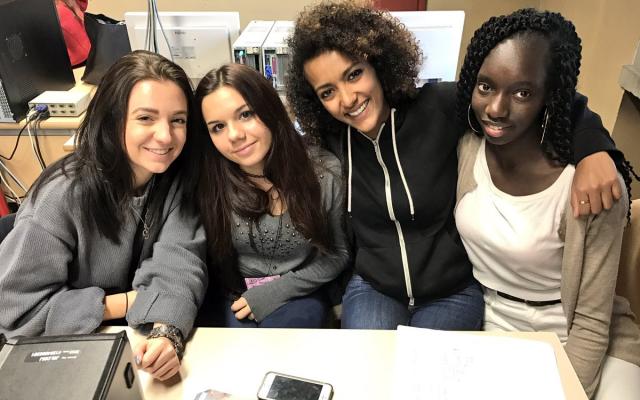Coding Girls in Mozambique: role modelling in the Province of Manica
With the beginning of summer, we take you to the Province of Manica in Mozambique, where a new office was opened for the Italian Agency for Cooperation and Development (AICS). We connect with the young girls and women in the city of Chimoio for a role modelling session organised by Programme Coding Girls in Mozambique. Project Coordinator Elisabetta Gramatica reports on the session.
Have a good read!
At the beginning of summer, there is often a feeling of relief and satisfaction. The end of the school year marks a year of intense work, full of challenges and different experiences. Every project completed, every student reached, every teacher met, every programme implemented represents an important stage in a journey that leads us to the rewarding thought of having contributed, even in our own small way, to the growth and development of those who rely on us every year.
At the same time, the number of activities with people, or rather, with the driving force of our work, the kids, is reduced. There is no more waiting around the labs of the main offices in Via del Quadraro in Rome, no more training in high schools between one question and another, no more hackathons in cities around Italy.
But not all is lost! For a few weeks, the feeling of nostalgia is balanced by the contagious enthusiasm of the groups of Mozambiquan students who began their coding courses on Monday, as part of the Coding Girls in Mozambique program. This morning, twenty students from the province of Manica met with Francesca Schettino, a brilliant biomedical engineer and coach at the Fondazione Mondo Digitale, who immediately captured the girls' attention by starting her presentation with an overview of how science and new technology can have a significant impact on people's lives, especially in the healthcare sector. She explained how technological innovation can improve the efficiency of medical care, facilitate early diagnoses, and make treatments more accessible, thus contributing to saving lives and improving people's quality of life.
Francesca then shared her personal life and study experience. She told us about her passion for humanities, which she tackled during her classical education, but also how, over time, her interest shifted towards other heroes: more modern ones who, through science and technology, have left their precious contribution. First of all, Katherine Johnson, Doroty Vaughan and Mary Jackson, three African-American women at NASA known as "the scientists who put man on the moon" and whose stories are also told in the film “Hidden Figures” (2016).
The meeting was very inspiring. The Mozambican students were able to see Francesca and her examples as a role model. “Listening to the views and ideas of young girls and trying to give them the motivation to pursue their dreams is a great honour for me. I always feel rich and full of emotions when I see their enthusiasm and desire to share and express themselves,” explains Francesca.
Welcome then, on the day of the summer solstice, to this mix of emotions.




